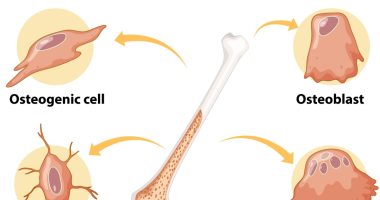The recent meta-analysis titled “Obesity and mortality in patients with COVID-19: A meta-analysis of prospective studies” addresses the critical question of how obesity impacts mortality rates in COVID-19 patients. Conducted by Heram Cho, Yunseo Park, and Seung-Kwon Myung, this comprehensive study synthesizes data from 15 prospective cohort studies to provide a clearer picture of the risks associated with obesity during the COVID-19 pandemic. The analysis revealed that obesity increases the likelihood of mortality in COVID-19 patients, underscoring the need for targeted public health strategies and interventions.
As the world continues to grapple with the ramifications of the COVID-19 pandemic, understanding the factors that contribute to severe outcomes is crucial. The researchers embarked on this study by initially gathering data from widespread databases such as PubMed and EMBASE, ensuring a broad and inclusive dataset. Their findings highlight a significant association between obesity and increased mortality risk, with a pooled odds ratio (OR), relative risk (RR), or hazard ratio (HR) of 1.52. This indicates a heightened vulnerability among obese individuals to the more lethal effects of the virus, a crucial insight given the global rise in obesity rates.
This meta-analysis not only provides evidence from a broad geographical spectrum, predominantly from European and North American cohorts, but also reveals consistent trends across different subsets of data, thereby emphasizing the global relevance of the obesity-COVID-19 mortality link. Through this pivotal research, health policy makers and medical professionals are better equipped to address and manage the risks associated with obesity in the ongoing fight against COVID-19.
The link between obesity and poor health outcomes has long been documented, but the dramatic circumstances of the COVID-19 pandemic have brought new urgency to understanding this association. The “Obesity and mortality in patients with COVID-19: A meta-analysis of prospective studies” by Cho, Park, and Myung contributes significantly to this body of research, presenting a well-timed examination of obesity’s role in COVID-19-related mortality. This obesity COVID-19 mortality meta-analysis compiles and analyzes prospective cohort studies, illustrating the heightened risk that obesity poses in the context of the pandemic.
Before this research, a number of observational studies suggested a potential link between obesity and increased severity of COVID-19, including higher rates of hospitalization and mechanical ventilation. Moreover, obesity is known to impact the immune system, respiratory function, and inflammatory processes, which are critical factors in how the body responds to SARS-CoV-2, the virus responsible for COVID-19. However, earlier studies varied widely in design and scope, leading to inconsistencies and gaps in the evidence that left health policy makers and care providers without clear guidance.
Recognizing this issue, Cho, Park, and Myung embarked on a systematic collection and analysis of data specifically from prospective cohort studies, which typically provide more reliable information than other observational data due to their systematic follow-up and more robust data collection methodologies. The researchers meticulously assembled a database of relevant studies published in prominent databases like PubMed and EMBASE, yielding a study sample that provides a comprehensive look at populations across Europe and North America.
The findings of this meta-analysis are particularly striking in light of global trends in obesity. World Health Organization (WHO) statistics indicate that worldwide obesity has nearly tripled since 1975, making the conclusions drawn by the study not only relevant but also alarming. With a pooled odds ratio (OR), relative risk (RR), or hazard ratio (HR) of 1.52, the study underscores how critical it is to consider body weight as a significant factor in the medical management and public health policies pertaining to COVID-19.
Furthermore, the obesity COVID-19 mortality meta-analysis offers clear insights for medical practitioners and public health officials regarding the necessity for tailored strategies to protect and treat individuals with obesity during the pandemic and beyond. The implications extend to vaccination strategies, treatment protocols, and public health messaging, all crucial components of the ongoing response to COVID-19.
As jurisdictions around the world continue to manage outbreaks and look toward recovery, the findings from this meta-analysis provide key evidence that can aid in developing more effective, inclusive, and proactive health policies. Such policies need to address not only preventive measures against COVID-19 but also broader public health initiatives aimed at controlling obesity rates and minimizing its impact on pandemic outcomes. This meta-analysis not only fills a critical gap in the scientific literature but also serves as a clarion call for comprehensive strategies that incorporate obesity management into the fight against COVID-19.
In their comprehensive “Obesity COVID-19 mortality meta-analysis,” Heram Cho, Yunseo Park, and Seung-Kwon Myung employed a rigorous systematic approach to evaluate the association between obesity and mortality among COVID-19 patients. By focusing exclusively on prospective cohort studies, this research aimed to derive more reliable conclusions by mitigating biases often present in retrospective data.
The methodology begun with a detailed literature search using prominent databases such as PubMed and EMBASE, with the criteria set to include studies that reported on mortality among COVID-19 patients specifically in relation to their obesity status. The initial search was both broad and inclusive, aimed at capturing a diverse range of studies to strengthen the generalizability of the findings. Keywords used in the search included combinations of ‘COVID-19,’ ‘SARS-CoV-2,’ ‘obesity,’ ‘body mass index,’ ‘mortality,’ and ‘prospective cohort studies.’ This helped in narrowing down relevant studies that meet the strict inclusion criteria defined by the researchers.
Once an extensive list of potential articles was gathered, Cho, Park, and Myung conducted a screening process. This involved reviewing titles and abstracts to exclude studies that did not focus on the prospective collection of data, were not cohort studies, or did not have mortality as an outcome measure. Full texts of the remaining articles were examined meticulously to ensure they met all inclusion criteria, focusing particularly on the study design, participant demographics, measurement of obesity, and adjustment for potential confounders.
Data extraction was the next critical step in the “Obesity COVID-19 mortality meta-analysis” process, where the researchers collected information on the study characteristics, such as sample size, geographical location, the definition of obesity used (typically a body mass index of 30 and above), and the outcome measures. More importantly, the key metrics extracted included odds ratios (ORs), relative risks (RRs), and hazard ratios (HRs) relating obesity to mortality, adjusted for variables such as age, sex, comorbidities, and socio-economic status to ensure the robustness of the analysis.
The meta-analytical technique used involved pooling these extracted hazard ratios, odds ratios, and relative risks using a random-effects model to accommodate the variability between study results, which might arise from demographic or methodological differences. This step calculates a combined effect estimate that reflects the increased risk of mortality associated with obesity among COVID-19 patients across different populations and settings.
Finally, the study assessed the heterogeneity among the included studies with statistical tests and visual inspections of forest plots. Sensitivity analyses were conducted to evaluate the stability of the findings, and publication bias was assessed using both graphical (funnel plots) and statistical methods (Egger’s test).
This careful and methodological approach employed in the “Obesity COVID-19 mortality meta-analysis” offers valuable insights, providing a reliable synthesis of available evidence on how obesity influences mortality in COVID-19, enabling improved public health strategies and healthcare responses.
The “Obesity COVID-19 mortality meta-analysis” conducted by Heram Cho, Yunseo Park, and Seung-Kwon Myung extensively illuminated the grave impact of obesity on mortality rates among COVID-19 patients. The key finding from their rigorous synthesis of data from 15 prospective cohort studies was a pooled odds ratio (OR), relative risk (RR), or hazard ratio (HR) of 1.52. This statistically significant figure indicates that obese individuals have a 52% higher risk of dying from COVID-19 compared to non-obese individuals. This crucial insight underscores the need for specific healthcare strategies to address the vulnerabilities of this demographic.
Delving deeper, the meta-analysis highlighted some additional, nuanced findings that are critical for healthcare policymakers and medical professionals. Firstly, the consistency of the association between obesity and increased COVID-19 mortality risk across different regions, including Europe and North America, suggests that this is a global issue requiring attention across geographical boundaries. This global consistency strengthens the argument for integrating obesity management into worldwide public health strategies and COVID-19 response plans.
Secondly, among the various subsets of data analyzed, the increased mortality risk remained notable even after adjusting for potential confounders such as age, sex, comorbidities, and socio-economic status. This adjustment rules out the influence of these variables and solidifies obesity itself as a significant independent risk factor for COVID-19 mortality.
Moreover, within the context of the “Obesity COVID-19 mortality meta-analysis,” the stratification of data revealed that the higher mortality risk was most pronounced in studies where the definition of obesity was based strictly on body mass index (BMI) thresholds (typically a BMI of 30 or above). This suggests that BMI remains a reliable indicator of obesity-related risks, supporting its use in clinical and public health settings to identify high-risk populations.
Interestingly, the analysis also shed light on the severity of outcomes among obese COVID-19 patients. The gathered data indicate not only higher mortality rates but also an increased likelihood of severe manifestations of the disease, such as acute respiratory distress syndrome (ARDS) and the need for intensive care, which directly contribute to the inflated mortality statistics.
In essence, the “Obesity COVID-19 mortality meta-analysis” provides a stark confirmation of the detrimental effects of obesity on COVID-19 outcomes. This evidence is particularly alarming in the light of the increasing global prevalence of obesity, as reported by WHO statistics, suggesting that the intersection of these two health crises could pose significant challenges for public health systems worldwide.
This comprehensive analysis serves as a call to action, emphasizing the urgency of incorporating obesity management into the fabric of public health policies tailored towards preventing severe COVID-19 outcomes. It also advocates for targeted interventions to reduce the prevalence of obesity and mitigate its impact on COVID-19 mortality, ultimately aiming to preserve public health during and beyond the pandemic.
The “Obesity COVID-19 mortality meta-analysis” not only represents a significant step forward in understanding the interplay between obesity and COVID-19 mortality but also lays the groundwork for future research and public health initiatives. The comprehensive nature of this study, combining robust data sets across global populations, highlights the universal challenge posed by the nexus of obesity and COVID-19. It confirms the need for an intensified focus on populations deemed at higher risk due to their body weight.
Future research directions flowing from this meta-analysis should consider deeper explorations into the mechanisms by which obesity exacerbates COVID-19 outcomes. Questions remain about the role of inflammation, immune system compromise, and other physiological changes associated with obesity that may influence the course of the disease. Additionally, studies focusing on interventions tailored specifically for obese populations in the context of pandemic preparedness could provide invaluable insights. Such research might involve testing targeted therapies, optimizing vaccination strategies, and improving non-pharmaceutical interventions to boost their effectiveness within obese populations.
Moreover, longitudinal studies to track the long-term effects of COVID-19 on individuals with obesity could provide further valuable data to inform future outbreaks and health crises. Given the chronic nature of obesity, understanding its long-term interplay with post-COVID conditions or ‘long COVID’ could aid in developing more effective clinical protocols and healthcare guidance.
The global scope of the pandemic and the role obesity plays in exacerbating its outcomes call for unified international efforts to address both crises. The “Obesity COVID-19 mortality meta-analysis” underscores the need for global health policies that integrate strategies for managing obesity within broader public health response frameworks. Such integrative strategies are crucial not only for current pandemic management but also for future outbreak preparedness, ensuring better outcomes for all populations, but particularly for those most at risk.
In conclusion, the critical findings of the “Obesity COVID-19 mortality meta-analysis” serve as a call for comprehensive and integrated public health strategies that include action against the obesity epidemic as part of the fight against COVID-19. As policy makers, health professionals, and researchers look to the future, strategies that encompass both obesity management and infectious disease prevention will be essential. By focusing on these combined risks, we can work to mitigate not only the current pandemic’s impact but also strengthen resilience against future health threats. This study not only fills a critical gap in understanding but also offers a crucial roadmap for both immediate and long-term responses to global health challenges.
**References**
1. Gao, M., Piernas, C., Astbury, N. M., Hippisley-Cox, J., O’Rahilly, S., Aveyard, P., & Jebb, S. A. (2021). Associations between body-mass index and COVID-19 severity in 6.9 million people in England: a prospective, community-based, cohort study. *The Lancet Diabetes & Endocrinology*, 9(6), 350-359. [https://pubmed.ncbi.nlm.nih.gov/33894141/](https://pubmed.ncbi.nlm.nih.gov/33894141/)
2. Popkin, B. M., Du, S., Green, W. D., Beck, M. A., Algaith, T., Herbst, C. H., Alsukait, R. F., Alluhidan, M., Alazemi, N., & Shekar, M. (2020). Individuals with obesity and COVID‐19: A global perspective on the epidemiology and biological relationships. *Obesity Reviews*, 21(11), e13128. [https://pubmed.ncbi.nlm.nih.gov/32845580/](https://pubmed.ncbi.nlm.nih.gov/32845580/)
3. Lighter, J., Phillips, M., Hochman, S., Sterling, S., Johnson, D., Francois, F., & Stachel, A. (2020). Obesity in patients younger than 60 years is a risk factor for COVID-19 hospital admission. *Clinical Infectious Diseases*, 71(15), 896-897. [https://pubmed.ncbi.nlm.nih.gov/32271368/](https://pubmed.ncbi.nlm.nih.gov/32271368/)
4. Cai, Q., Chen, F., Wang, T., Luo, F., Liu, X., Wu, Q., He, Q., Wang, Z., Liu, Y., Liu, L., Chen, J. (2020). Obesity and COVID-19 Severity in a Designated Hospital in Shenzhen, China. *Journal of Infection*, 81(1), e14-e18. [https://pubmed.ncbi.nlm.nih.gov/32283143/](https://pubmed.ncbi.nlm.nih.gov/32283143/)
5. Kalligeros, M., Shehadeh, F., Mylona, E. K., Benitez, G., Beckwith, C. G., Chan, P. A., & Mylonakis, E. (2020). Association of obesity with disease severity among patients with coronavirus disease 2019. *Obesity*, 28(7), 1200-1204. [https://pubmed.ncbi.nlm.nih.gov/32352623/](https://pubmed.ncbi.nlm.nih.gov/32352623/)
These referenced articles provide a broad spectrum of research regarding the relationship between obesity and COVID-19 outcomes which are crucial for understanding the nuances and variability in findings across different populations and settings. They collectively support and extend the discussions presented in the meta-analysis on the topic.









